- Home
- William Kowalski
Eddie's Bastard Page 35
Eddie's Bastard Read online
Page 35
“You’re kidding.”
“Hell no,” said Henry Hutchins. “And then the hippies came in and sat at the bar. The whole place was still quiet. Eddie had taken control, you see, and everyone was waiting and watching him to see what to do next.”
“What did he do?”
“All he did was sit down. I think they were expecting something a little more dramatic, but he disappointed them on that count. He brought the hippies over to the bar and ordered them a round of beers, and we all moved to a table and sat around it.”
“And one of them was Eliza?”
“We didn’t get to names right away,” he said. “But there was only one woman with them. In fact, she was the only woman in the whole bar, but that didn’t seem to bother her one bit. I don’t think she was even aware of that. She was absolutely beautiful. I couldn’t take my eyes off her. I never stood a chance with her, of course, not with Eddie in the same room. She was three or four inches taller than he was, but she was looking at him like he was a Greek god who’d just dropped by in his flaming chariot for a quick drink. And Eddie kept looking at her, too.”
“He was putting the moves on her?”
“Don’t get me wrong,” said Henry. “Eddie was very aware of the power he had over people, and he never abused it. He hated to dominate a situation. Most of the time he just sat back and let things take their course, except when he absolutely couldn’t keep his mouth shut. That was part of his power, even. That kind of sitting back. You were aware of him even when he wasn’t saying a word. But I think everyone knew right away there was something in the air between him and Sky. Some kind of electricity, or chemistry, or whatever branch of science you wish to attribute it to. Curious, isn’t it, that we speak of love in such scientific terms? Anyway. No, Eddie wasn’t the kind of guy to put moves on women. Part of it was because he didn’t have to—they came to him instead. But part of it was that he thought there was something indecent about it. He thought it cheapened women to get hit on. Or maybe he thought it cheapened the men who were making the advances. I don’t know. He hated the whole business, anyway.”
“So how long did you hang out with them?”
“Well, we were in the bar for about an hour,” said Henry. “And then we went with them to some party somewhere. Needless to say, we were the only guys at the party in uniform, and we got a lot of strange looks. Most everyone there had hair down to their asses. They were smoking a lot of grass and drinking wine, and sitting around playing all these musical instruments, and some of them were tripping on acid, I remember, because there was this one guy who came up to me and stared at my medals for like ten minutes. When I finally asked him what the hell he was doing, he said they were singing to him. It was really wild.”
“And Eliza came with you?”
“It was her party,” he said. “It turned out it was her house. She didn’t own it, but she lived there, with some other people. But she didn’t call herself Eliza. She was Sky. How did you find out her real name?”
I gave Henry a brief rundown of Doctor Connor’s letter.
“She went to Mannville to have you?” he asked, surprised.
“I guess. That’s where I was born.”
“Why didn’t she stay with your grandfather?”
“I don’t know. She left me on the doorstep.”
“On the doorstep?”
“With a note.”
“Well,” said Henry Hutchins. “That surprises me.”
“Why?”
“Because she seemed like a very responsible person,” he said.
“So you got to know her?”
“A bit,” said Henry. “We actually ended up staying there all weekend. We were having too much fun to leave.”
“And is that when I was conceived?”
“Well, it must have been,” he admitted, “because they spent most of their time in bed.” Henry Hutchins blushed slightly. So did I.
“They did?”
“They were inseparable,” said Henry. “They didn’t come out of her room. I was left to myself most of the time, but that was all right because there were people trooping in and out of the house constantly, and they were all very nice to me, even though I was in uniform. I was actually enjoying myself quite a bit. It was the strangest time I’d ever had. But that was what I liked about it. That weekend changed my life, actually.”
“Why?”
“Well, between you and me, I took some acid.”
“You did?”
“Don’t take that the wrong way,” said Henry Hutchins. “I don’t recommend it to anyone. Especially young people. I’m not endorsing it. I took it on the spur of the moment. It lasted a long time, I remember. It was really strong stuff. I’ve never taken it since.”
“What happened?”
“Well, at first it was a lot of fun. I was laughing at everything, and everyone seemed wonderful, and life was suddenly revealed to be the big joke I’d always suspected it was. Aldous Huxley says it best—the doors of perception were opened for me. But about twelve hours into it I started having what they call a bad trip.”
“What was that like?”
“Awful,” he said. “Worse than war. Worse than the fear of death. It was just inescapable. I can’t really describe it. It was just like this huge void had opened at my feet, and I couldn’t look into it and I couldn’t look away. That’s when I really started to freak. I was thinking about going back to Nam, and I just totally lost it. Eddie had to come out and talk me down.”
“What did he do?”
“He just sat there with his arm around me. He must have stayed with me for something like six hours. He didn’t say much, which was perfect. When he knew I was ready to do some listening he started talking me through it. It was like he was taking me on a guided tour of my soul. Somehow, he knew exactly how I felt.”
“What did he say?”
Henry pursed his lips and looked thoughtfully at the ceiling. “Something about just letting it in. Not shutting anything out. Just letting it swallow me.”
“Was he taking acid too?”
“No way,” said Henry. “Not him.”
“Then how did he know what to say?”
“That was Eddie,” he said. “He knew how to do everything, even things he’d never done. Sometimes I got the feeling he’d lived before. I mean, supposedly everyone has lived before. At least that’s what you believe if you’re a Hindu or a Buddhist. But I sometimes wonder if Eddie didn’t remember everything from his past lives.”
For a moment I debated telling Henry Hutchins about my experience with the old Mennonite witch-lady when I was a little boy. But the evening was wearing on, and I still had the long drive back to Mannville to make that night.
“So what happened later? When you left, I mean. With Sky and my dad.”
“Oh. Yeah. You know, I don’t remember that part too clearly. I’m sure they exchanged addresses. They must have, for Sky to find out where your grandfather lived. Maybe they planned on getting together after the war. God, they would have been a beautiful couple.”
“So Eddie had her address?”
“I would think so.”
“What did they talk about while they were in that room together? Did he ever tell you?”
“No, and I didn’t ask. But afterward he was sort of glowing, like he’d just had some sort of religious experience. That struck me as unusual. Women didn’t usually affect him like that. He’d met so many of them, you see. I don’t mean he was jaded. He just wasn’t the type to go head over heels over a girl. That kind of behavior was sort of beneath him.”
“But he did this time?”
“Well, he came the closest I had ever seen him come. He didn’t talk much after we left. He just sat there and hummed to himself. I think he was very happy.”
“What did you guys do after that?”
“We came back here, to this very house. And the next day Eddie went back to Mannville.”
“And then you both shipped out again?�
��
“Three days later,” Henry confirmed. “And it was the next February that he was shot down. I’m sorry. It must be hard for you to hear his death spoken of.”
“I’m used to it,” I said. “I never knew him.”
“That’s right. I forgot. What a shame that is. He would have loved you, kid.”
“Anyway,” I said, “you don’t know where I might look for my mother?”
“I’m sorry, Billy,” he said. “I never saw her again, and I don’t think your dad did either. Maybe they wrote letters to each other. If they did, they should have been shipped home with his personal effects. Did your grandad get anything like that? A box of stuff from the Air Force?”
“I don’t know,” I said, feeling like an idiot. Why hadn’t I thought to ask Grandpa that myself? Because I’m an amateur, I reminded myself. I’ve never tried to track anyone down before.
“Henry,” said a high, shaking voice. “Who is that man?”
Henry and I turned to see his mother standing in the dining room, pointing a finger at me. She was completely naked.
“Jesus, Mom,” said Henry. “I’m sorry, Billy.” He got up from the couch with a blanket and went to cover her. I averted my eyes.
“Don’t worry about it,” I said.
“Let me know how things turn out,” Henry called over his shoulder as he took his mother back to her bedroom. “I’ve enjoyed talking to you, kid. You’re a chip off the old block.”
I took that as my cue to leave.
“Thanks, Mr. Hutchins,” I said. “I’ll let you know what happens.”
I let myself out into the narrow driveway and squeezed into the Galaxie, which Grandpa had loaned me for the trip. On the way home, I mentally searched the entire farmhouse in Mannville for something. Anything. I was missing a vital clue. I could feel its absence as though the gap itself was a palpable object, yet I didn’t know what it was. But I was getting closer. I could feel that too.
12
My Eighteenth Year; the Next Round of Three; I Bury Frederic Simpson; Grandpa’s Narration, and His Departure
From Willie Mann’s diary:
We humans are a lot of monkeys running hither and thither, living in fancy cages of our own devising and slowly inventing the means to destroy ourselves. Before us also came a long line of monkeys, who through no grandiose intentions, but through the simple ability to procreate—or the inability not to—gave rise to us. For the most part they have been a depraved, murderous, hateful group, stealing land from other monkeys and wiping out other monkey tribes. Some of us modern monkeys seem to think much of our ancestors, and are proud to trace our monkeyhood back several generations, perhaps even as far as those original murdering monkeys, the Europeans. But I myself see little in our species’ history of which to be proud. It is far too late to prevent our worst errors as humans. Even if they haven’t been committed yet, the stage has already been set. My only concern now is for my family. I wish to keep this diary so that my descendants will know the mistakes we monkeys known as Mann have already made. Some mistakes are inevitable, but I do not wish the more serious ones among them to be made again.
Willie Mann wrote those words as he neared the age of ninety. For the last seventy-five years of his life, beginning when he was twenty-one and just learning how to write, he made daily entries in his journal. He thought—he hoped—that by doing this he might have some effect on the Manns who came after him. He didn’t want fratricide, or greed, to come tearing through his family ever again, even after he was dead.
I hadn’t yet read the entry above, of course. I hadn’t even seen the diary yet. It was still in Japan, and how much longer it would be there I had no idea, but I hoped for its safe return because I knew its value to me would be incalculable.
“I don’t know how you could just give it away like that,” I fumed to Grandpa one day. “I mean, did you think nobody else was ever going to be interested?”
“Think about it, kid,” said Grandpa. “I was nineteen years old. Your father wasn’t even born yet. I was an only child. I didn’t think I was going to survive the war. You did things impulsively in those days because the moment was the only time that was. Plus, I didn’t like what I read in it. I wanted to get rid of it.”
Grandpa had hinted before that there was something revealed in the diary that, at the time, he found too shameful to think about. He still refused to talk about it, although whether his reticence was due to pride or lack of memory I never discovered. Grandpa was adept at feigning a tattered mind when it suited his purposes.
“You don’t have an address for this Fujimora guy? Some way I could write to him and make sure he’s coming back?”
“He was from Nagasaki,” said Grandpa. “Nagasaki was nuked. Even if he’d given me an address, that house would just be a shadow on the street now.”
“How do you know he’s still alive?”
“He’s alive.”
“But what if he doesn’t show up at all?”
This was the big question, one that had been brewing in my mind for some time. This whole system they’d concocted of simply knowing when the other was going to die seemed far-fetched and unreliable. I would have preferred a slightly more certain method of notification, such as a phone call.
But Grandpa remained secure. “He’s coming,” he said. “I can feel it. And it won’t be long now.”
It wouldn’t be long now because, according to Grandpa, the next round of three had begun with the death of Frederic Simpson, and he was convinced he would go in this round. His number was up, he said. He was about to hang up his hat, to check out, to buy the farm, to kick the bucket. He was so sure of himself that he asked for his grave to be dug now, while the earth was still thawing, so it could be drained periodically before he was put in it. He didn’t mind the idea of being dead and cold, he said; but being dead, cold, and wet was intolerable. Ever since his involuntary dip in the South Pacific, Grandpa had hated water.
“Humor an old man,” he said, and so I called the funeral director, and he called the cemetery, and the cemetery called their gravedigger, and the grave was dug.
I went out to see it without telling anyone. I had the crazy idea that I would get in the grave myself for a moment, just to see what it was like to be in there. I don’t know why I wanted to do that, but I was eighteen years old, and I believe that explains a good deal of it. It was a poetic gesture of the sort only eighteen-year-olds are capable of conceiving. I did many things at eighteen that I’ve spent the rest of my life trying to understand. But when I arrived, the grave looked so unpleasant I changed my mind about getting in it. Grandpa was right. The earth was soggy and cold and dank, and I had the terrifying impression that if I poked my finger through the earthen walls I would touch one or another of the innumerable Mann coffins that populated this part of the cemetery so densely.
We would never have known of Frederic’s death if it hadn’t been for Mildred’s morbid habit of reading the obituaries each morning. She read them first thing, even before the headlines, and when she found a name she knew, she read the whole notice out loud. It was a peculiar habit, one that unnerved me; but Grandpa said that when I reached old age I would do the same thing, simply because my deceased acquaintances would start to outnumber my living ones.
“You have to keep up with what’s going on in the world,” he said. “And when you’re our age, what’s going on is death, and lots of it.”
Someone had written a brief notice for Frederic, describing his service in Vietnam and mentioning that he was “severely wounded,” after which he was cared for by his “loving father, whom he survived.” The notice made no mention of a sister named Annie. Most likely, I thought, it was written by one of the nurses at the VA hospital where Frederic had been moved. Only a complete stranger could have made the mistake of calling Mr. Simpson “loving.”
I felt as if a huge burden had been lifted from my chest. I breathed more fully, more easily, knowing that poor Frederic was finally released
from the prison of his body. It terrified me to think he might have had full use of his mental faculties all along. Even though that was unlikely, the mere possibility of it sometimes kept me awake at night, paralyzed with sympathy, pretending I couldn’t move and never would again. After such a life as his, I often thought, the notion of hell would hold little discomfort. That morning I clipped the obituary out and mailed it to Annie in Montreal with something akin to joy; my relief, I was sure, would pale in comparison to hers.
Grandpa went matter-of-factly about the business of making preparations for his own death. He’d purchased an airtight, waterproof coffin, made out his will, and begun in advance the myriad tasks that a modern death enforces upon us. “Damn it,” he sighed, on numerous occasions. “You can’t just drop dead anymore, can you?” When he heard about Frederic, he knew his time was not far off, and he decided formally to announce to me that he would be leaving soon. His liver had never recovered from the punishment he’d dealt it over four decades of hard drinking. It had been failing gradually for years, and according to the doctors at the hospital, it was about to go out on him completely.
“It could be another year yet,” he told me, “so don’t go around blubbering.”
“All right,” I said. I was trying to fight down the horrible feeling in my chest. It was the same feeling I’d had when Annie had disappeared, the same feeling I’d had as a boy when I thought about my lack of a father and mother. It was the feeling of being left behind, a deep, vague opening sensation, centered somewhere deep within me and radiating outward, like an explosion.
“I do not wish to be hooked up to any machines,” said Grandpa. “I feel very strongly about that.”
“Okay.”
“There’s just no reason for being hooked up to machines except pure selfishness. Old people have a duty to get out of the way. Think of poor Frederic Simpson. Think I want to end up like that? All tubed up? Fuck it! Better off dead!”
“Yessir.” I was interested in changing the subject, but Grandpa went on.
“There’s no reason for us to go on consuming valuable resources just because we’re afraid of what comes next. Sometimes when I think of how long people are living these days it makes me sick. What’s the point? They don’t do a goddamn thing! They just lie there and complain. They’re a burden.”

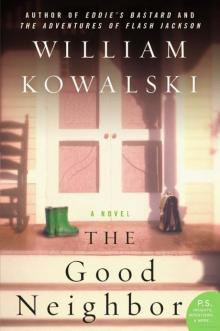 The Good Neighbor
The Good Neighbor Eddie's Bastard
Eddie's Bastard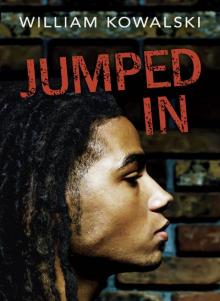 Jumped In
Jumped In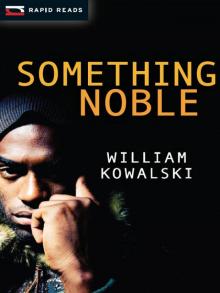 Something Noble
Something Noble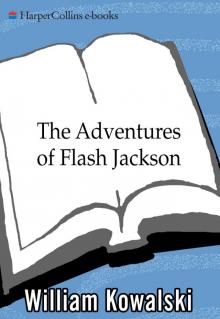 The Adventures of Flash Jackson
The Adventures of Flash Jackson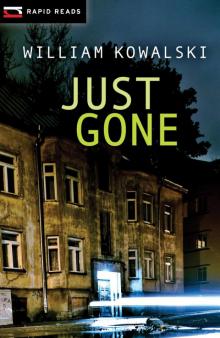 Just Gone
Just Gone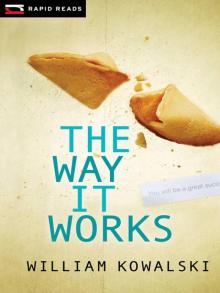 The Way It Works
The Way It Works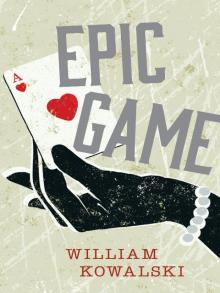 Epic Game
Epic Game